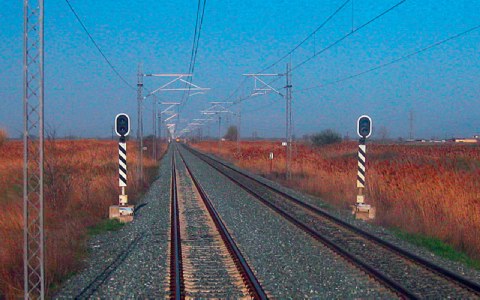Picture: Imerisia Newspaper
Over the last three years, the hundreds of thefts of cables from the Greek Railways lines (TRAINOSE) have been reaching alarming proportions and have caused enormous damage amounting to more than 70 million euro in addition to undermining the confidence of passengers travelling by train. This is becoming an everyday practice and TRAINOSE is forced to cancel scheduled trains, while at the same time it has to restore the network, which costs huge amounts of money for labour. It is no coincidence that in the beginning these sabotages were less frequent and occurred mainly in the area between Larissa and Thessaloniki, and in the last two years there are two sabotages per week, on average.

30 million euro are needed for the network recovery after the hundreds of sabotages. This involves construction works which will result in the reopening of the line from Oinoi to Tithorea, which is the most damaged part of the network. Reconstruction works are also necessary in the section SCA-Kiato and Halkida's network.
The last two sabotages occurred along the line Kineta - Agii Theodori and they have created significant problems in the movement of trains, leading to delays and cancellations of trains for almost a week, and last Monday TRAINOSE's program had to be changed due to sabotage along the Halkida line.
Since the beginning of the year dozens of thefts of cables have been committed, which are now thought to be targeted sabotages, since the phenomenon has expanded by vandalism at the substations of TRAINOSE. Over the past four years, more than 120 km of copper cables have been stolen, worth over 15 million euro if the price for their replacement is taken into account as well. Over the past two years, about 20 million euro have been returned to passengers because of delays and cancellations of trains. Damages to electrical lines force the railways to use diesel locomotives, which is much more expensive - by more than 80 per cent annually.

An auction has been organized in order for the functioning of the network to be restored. It is aimed at the procurement of works worth 22 million euro to restore the network from Akarnes to Tithorea. The project should be completed in 2014.
As explained by the Greek Railways, the thefts are organized gangs which include legal firms buying metals. According to them, there is a lack of will to solve the problem, since the copper trading firms are not many, and if they are required to issue the necessary invoices for each transaction, the question will be settled quite quickly. It is stressed that checks across the network will become more frequent and great efforts will be made to arrest the thieves. They will be required to pay compensations as well.
The police cannot provide protection for the railways' network, which, because of the many stopped lines and its abandonment, is an easy prey for the organized gangs - at least four bands, mainly Roma, have been caught stealing copper, which was later sold as a raw material. Despite the appeals, it is virtually impossible for the police to protect every mile of the network. At this stage, the railways will participate in European programmes, which will support the implementation of new technologies to limit incidences of sabotage.
The transformation of the open-air network into an underground one may partially solve the problem, although there are cases of thefts of underground cables as well. Moreover, such a solution is extremely expensive at a time of crisis.
It should be noted that electric locomotives are not operating from Athens to Larissa and in this section diesel ones are still used, while from Larissa to Thessaloniki, where the network is electrified, the continuous sabotage is causing major problems, reducing the cost of the railways. Electrical lines are absolutely necessary for the railways, because costs are greatly reduced this way, the speed is much higher, and the trains are more environmentally friendly.
According to TRAINOSE studies, the cost of transporting a passenger per kilometre (the transport of one passenger at a distance of 1 km) with an electric train is 1/10 that of the diesel ones.